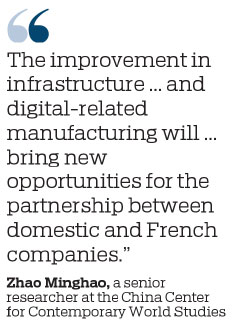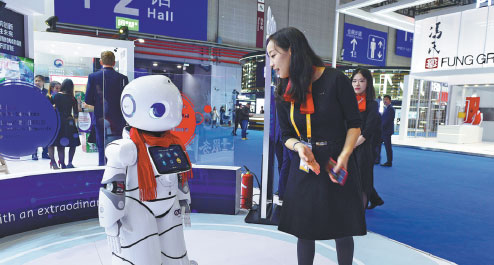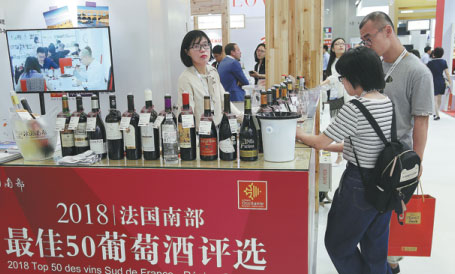Sino-Franco trade relationship emphasized
Digital innovation, new energy, aviation among areas nations striving to improve
The future of Chinese-French business ties will be based on trade and diversified cooperation in aviation, digital innovation, new energy, high-end manufacturing and service trade, said business executives and experts from both countries.
Though both the Chinese and French economies have been affected by protectionism over the past two years, the degree of interdependence between the two remains stable in bilateral cross-industry trade, said Zhao Ping, director of the department of international trade research at the academy of Beijing-based China Council for the Promotion of International Trade.
Bilateral trade volume between China and France amounted to $47.85 billion in the first three quarters of 2019, growing 5 percent on a year-on-year basis.
France, in the meantime, remained China's fourth-largest trade partner after Germany, the United Kingdom and the Netherlands within the European Union, data from the General Administration of Customs show.
China mainly exports construction machinery, manufacturing equipment, steel, electronics, textiles, garments and household appliances to France.
In addition to passenger vehicles and aircraft, water treatment, and chemical and pharmaceutical products, France's exports to China include fashion, agricultural and energy infrastructure products.

"China will continue to export consumer goods in exchange for France's high-tech products such as electronics, passenger aircraft, automobiles and parts, and medical equipment," said Ma Yu, a researcher at the Chinese Academy of International Trade and Economic Cooperation. "Most of their imports are complementary. Therefore it isn't direct competition."
In addition to growing trade volume, Ma said China's ongoing consumption and industrial upgrading boom has also attracted more French investment to China in intelligent manufacturing and smart city projects, digital economy and retail sectors in recent years.
Devialet, a French acoustic engineering technology specialist that is known for its audio products such as high-end speakers, plans to expand its presence in more Chinese cities in the long run.
The Paris-headquartered company opened a concept store in Beijing and a flagship store in Shanghai in September. The brand aims to sell more audio products in China where a consumption upgrade has been running for a while.
Franck Lebouchard, CEO of Devialet, said the company plans to add more stores in Shenzhen and Guangzhou, both in Guangdong province, to expand its market presence in South China and attract more young consumers via cultural, music and arts events, as well as online channels.
"What has been very interesting to us is that three years ago, we opened our stores in Singapore, Tokyo, Hong Kong and Taipei. And we have seen many people from the Chinese mainland coming in to buy our products. Top-tier cities remain our priority markets in China," he said.
The company will focus on using digital tools to reach out to lower-tier markets across China. "We will continue to create a balance between physical stores and digital stores, as a large number of consumers use smartphones to explore things," he said, stressing about 20 percent of Devialet's sales today are contributed by China's e-commerce platforms including Tmall and JD.
Supported by more than 160 patents, the company runs two factories in France. Its products are sold in 40 other stores across the Chinese mainland.
Apart from China's fast-growing consumption market, French industrial group TLD established its regional headquarters in Shanghai in August, thanks to a business-friendly environment that is especially favorable for high-tech companies, after four decades of operation in China.
Thomas Dorn, the company's CEO for Asia, said the pushing power behind this decision is the city's easy transport connections to other parts of the Asia-Pacific region, the size of the Chinese market and the sufficient supply of manufacturing talent in the city.
Li Jin, chief researcher at the China Enterprise Research Institute in Beijing, said China's proposal to explore third-party market cooperation could also bring benefits to both Western nations and developing countries involved in the development of the Belt and Road Initiative, without causing a clash of interests.
He said projects involving China, France and some French-speaking African countries are a case in point.
Affected by the changing global situation and growing uncertainties, the BRI offers a new impetus to the recovery of the world economy, said Zhao Minghao, a senior researcher at the China Center for Contemporary World Studies.
"The improvement in infrastructure, transportation, healthcare and digital-related manufacturing will not only restore the developing strength of the world economy, but also bring new opportunities for the partnership between domestic and French companies," he said.
zhongnan@chinadaily.com.cn
|
|
|
|
(China Daily 11/05/2019 page5)
















